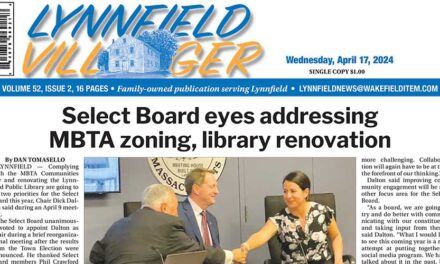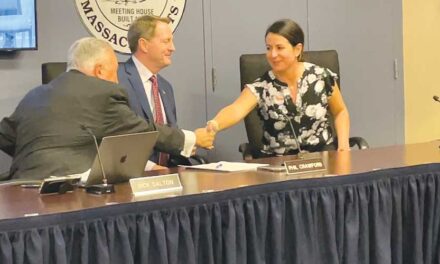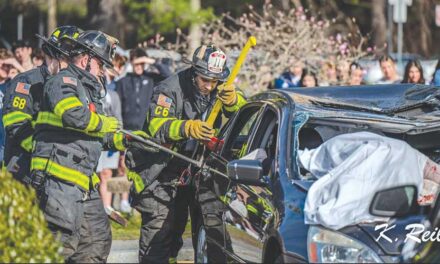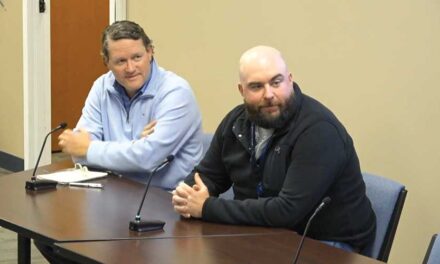Published in the July 17, 2019 edition.
By DAN TOMASELLO
LYNNFIELD — A Special Town Meeting that will ask voters to allocate funds for the Wakefield-Lynnfield Rail Trail is being eyed for September.
Friends of the Lynnfield Rail Trail President Vince Inglese announced at the Finance Committee’s meeting on Monday that the advocacy group is in the process of gathering 200 signatures for the Special Town Meeting. Inglese said the Friends are going to ask the town’s legislative body to appropriate $348,000 in order to cover the $10 million project’s final engineering costs as it moves toward the 75 percent design stage. He noted the Massachusetts Department of Transportation (MassDOT) will still be paying for the project’s construction costs.
“The Friends will place this warrant article via a citizens’ petition for a Special Town Meeting this September,” said Inglese. “The purpose is to request town funds for Lynnfield’s share required to complete the final design and engineering for the Wakefield-Lynnfield Rail Trail project. Our goal is to advance this project in a prudent manner.”
The Wakefield-Lynnfield Rail Trail would begin at the Main Street and Bennett Street intersection in Wakefield near the Galvin Middle School, extend north through Lynnfield and would go to the Peabody line. A portion of the rail trail would go through Reedy Meadow via an elevated boardwalk. The Wakefield component of the trail would be 1.8 miles while Lynnfield’s would be 2.5 miles.
Voters narrowly approved a non-binding referendum that supported moving forward with the Wakefield-Lynnfield Rail Trail 1,859 votes to 1,679 votes during the April Town Election. The close vote was similar to the April 2017 Town Meeting, when voters approved a citizens’ petition authorizing the Board of Selectmen to enter into a 99-year lease with the MBTA by a 342-341 vote.
Inglese said the “target date” for the Special Town Meeting is Thursday, Sept. 26. The Board of Selectmen will make a final decision when the Special Town Meeting will be held once the citizens’ petition is submitted to the town.
The advocacy group’s leader urged the Finance Committee and other boards in town to support the rail trail project.
“Rail trails, recreational paths and greenways are very contentious initiatives in almost every town,” said Inglese. “But in every town, once built, (they) are treasured assets. We feel strongly that (the Finance Committee’s) endorsement will help advance this project.”
Inglese said Lynnfield’s share of the engineering costs total $348,000. He noted the town was awarded a $100,000 reversible grant from the Massachusetts Department of Conservation and Recreation last year, which he said would offset the final price tag. He said the grant will expire next summer.
“We will likely be able to use the awarded $100,000 DCR grant to reduce our funding need to $248,000 this year,” said Inglese.
Inglese said MassDOT recently pushed the project back from 2021 to 2023.
“It is quite apparent this decision is based on what state officials see as a lack of commitment from town leaders to provide funding,” said Inglese.
Inglese said the lawmakers representing Lynnfield and Wakefield in the state Legislature were able to secure $500,000 for the project as part of an Environmental Bond Bill last year. He said the state has yet to release those funds, which is why he said the town needs to appropriate money for the engineering costs.
“We concluded that the Special Town Meeting approach is appropriate because we believe (the rail trail) is one of the best value-added opportunities in decades,” said Inglese. “These recreational trails are treasured assets in communities.”
Locksley Road resident Patrick Curley gave a brief overview of the proposed warrant article, which he has submitted to Town Counsel Tom Mullen and Town Administrator Rob Dolan to review. He said the warrant article is based on similar articles that have appeared on town meeting warrants in Concord, Sudbury and Swampscott.
Reaction
Finance Committee member Kevin Sullivan inquired why the rail trail’s supporters believe the funds included in the Environmental Bond Bill will not be allocated to the town.
Inglese said state Sen. Brendan Crighton (D-Lynn) and state Sen. Jason Lewis (D-Winchester) have informed him the probability of the town receiving the $500,000 is “very low.”
In response to a question from Finance Committee member David Morales, Inglese said the Friends plan on collecting more than 200 signatures in order to move the Special Town Meeting request forward.
Patrice Lane resident Pat Campbell reiterated her opposition to the proposed rail trail. She recalled that the FinCom recently expressed concerns about the town’s budget in a letter that was handed out during April Town Meeting.
“(The Friends) are coming to the well not only for the trail, but a Special Town Meeting,” said Campbell. “We don’t need a rail trail. It’s a want, not a need.”
Sullivan, who served on the Fields Committee, recalled that residents have expressed interest in the town developing walking paths on surveys compiled by the Fields Committee and Master Plan Committee.
“It is a need,” said Sullivan.
Campbell countered by stating the non-binding referendum question passed by 180 votes.
Rail trail opponent Jill Giugliano claimed the state’s roads and bridges “will suffer” if MassDOT builds the rail trail instead of appropriating the money for other state infrastructure projects.
“It’s a waste of money to do this when we have serious needs in this town,” said Giugliano.
Finance Committee Vice Chairman Tom Kayola noted the town voted to move forward with the rail trail project on two occasions.
“They were close votes,” said Kayola.
The rail trail’s supporters and opponents repeatedly sparred throughout the meeting, which frustrated Finance Committee Chairman Chris Mattia.
“The two groups arguing is not helping anybody,” said Mattia.




